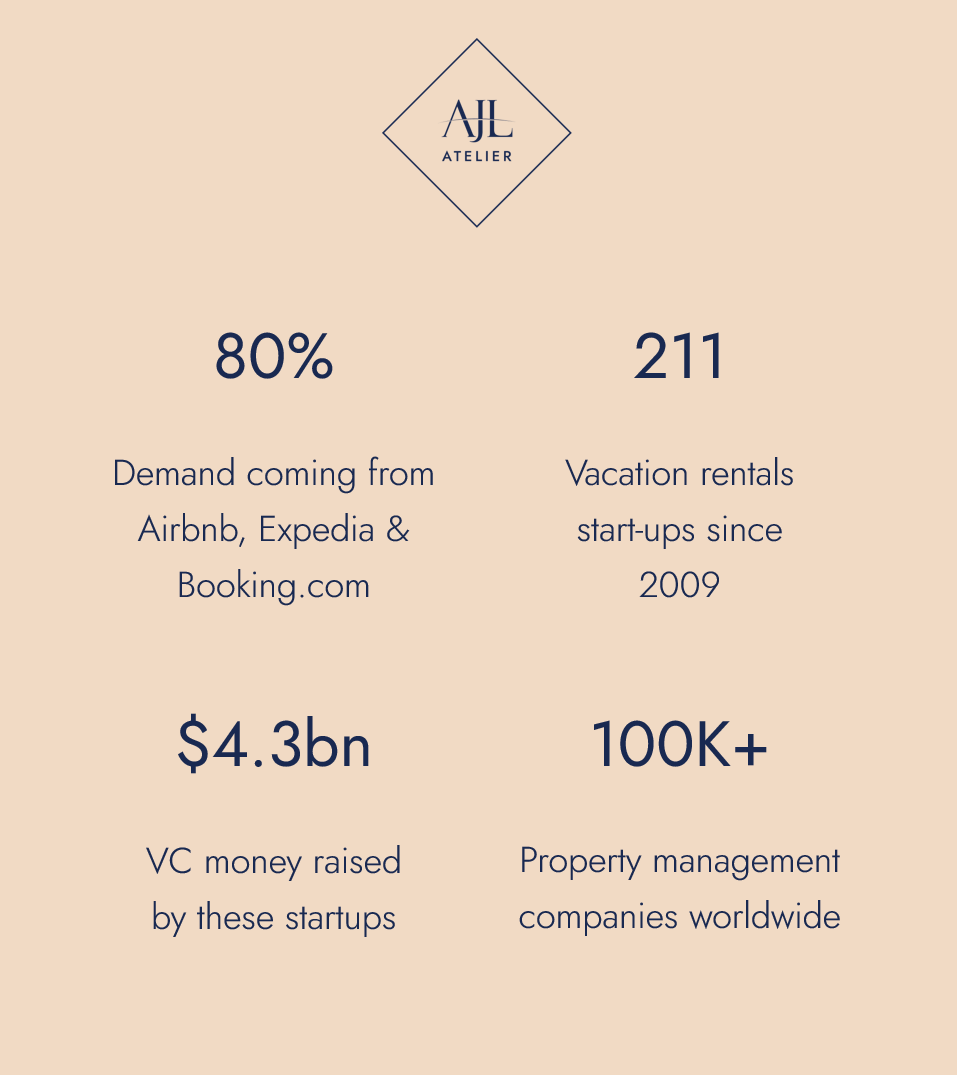The recent placement of Hostmaker under administration in the UK, lay-offs at Lyric and the media interest around OYO’s trouble to articulate extreme growth and profitability, is raising a lot of questions in the short-term rental industry.
A lot of these questions revolve around profitability, scale, and more specifically are directed towards urban property management companies backed by VCs.
Covid-19: the wake-up call for property management companies
The impact of COVID-19 has yet to fully play out in the short-term rental industry, but we are sure that the vulnerability of many businesses will become apparent.
Well-run companies, with profitability as a core metric, are going to be stronger and more able to sustain themselves rather than those that have only survived because of investment and are focussed on revenue rather than profitability.
A lot of money has been poured into our space, making the word investment and the announcement of how much capital has been raised, a must have for some companies wishing to showcase a successful model with a bright future of unlimited growth and the promise of an achievable profitability once a critical mass has been reached.
According to a study on the short-term rental industry, soon to be released by Phocuswright, there has been a total of 211 start-ups since 2009, which have raised in total $4,3 billion USD.
Airbnb has flooded the market with supply and urban property managers have sprung up like mushrooms in fertile soil. However, the tide is turning now.

The rise of profitability at the top of the vacation rentals agenda
When asked about our industry predictions for 2020, AJL Consulting forecasted that profitability was likely to become the main focus of our industry, both for the property managers, the tech start-ups as well as the OTAs, especially in light of the looming IPO of Airbnb.
Recently, many external elements have come to disrupt many start-ups’ dreams and have forced a brutal reality check for some operating in the urban short-term rental space.
Regulations in many global cities have limited the available supply. Both in terms of the number of units and the number of days these units could, legally, be rented on a short term basis, thus making some unit economics assumptions unachievable. However, in other markets, the lack of regulations has led to an oversupply and me too businesses have mushroomed, making it increasingly more difficult for professional property management companies to make ends meet.
At the same time, the online distribution landscape has been consolidated, for operators outside Asia, the three OTA giants are now producing close to 80% of the demand. With Google entering the fray with their travel products, further disruption of this space is inevitable.
As if these two elements above were not enough, the fact that short-term rentals are becoming mainstream and we are seeing a convergence of hospitality models is leading to a dramatic increase in guest expectations which puts even more pressure on operators.
However, on the bright side, the rapid growth of our industry has led to the emergence of hundreds of tech start-ups trying to solve each individual pain point for PMCs. The effect has been streamlining some of the operational facets across the value chain.

Consolidated distribution, fragmented everything else: the true state of short-term rentals
The problem with this type of hyper verticalization, reinforced by the fragmentation of each individual vertical, is that many of these start-ups are also struggling. First of all, these ancillary services can only be effective if there exists the opportunity to integrate with other pieces of the tech stack and there are hundreds to choose from.
Many of these tech start-ups are addressing the same customers and sometimes the lack of differentiation of their product, makes their business models challenging. This has led to a variation on pricing in some cases, making growth even more essential and profitability only achievable through scale.
The question now is how will this affect different players in the short-term rental industry, what strategy could undercut these negative effects and therefore why must profitability become the new focus?
First of all, we need to debunk a myth. The only space that is consolidated in the short-term rental industry is the online distribution space. Period.
The vacation rental tech space is still over-fragmented and supply is even more so. As of today, according to Transparent Intelligence, the 20 largest PMCs control only 1.5% of the supply globally, and there are over 100,000 PMCs in the world.
In an excellent article “Why is there so much ‘red’ around vacation rental unicorns’ posted on VRMB, James Olin from C2G Advisors was clearly drawing the line between “mom and pop” businesses and “start-ups” when it comes to property management. It really is crucial to understand this difference and James explains it very well.

Leisure-orientated “mom and pops” vacation rentals vs short-term rentals “start-ups”
As a rule of thumb, classic “mom and pops” are historically leisure-oriented businesses in traditional markets and “start-ups” are usually urban operators that have been created because of the success of Airbnb.
The former, even if historically older and intrinsically profitable, has not seen a massive influx of capital. Whereas the latter, which can only promise profitability at scale and under certain unit economics, has seen a massive influx of capital in an extremely short amount of time.
Just look at it this way. Awaze with 100,000 units under management (mostly leisure) is not considered a Unicorn (valued at over $1 billion). Neither are Interhome or Sykes Holidays but Vacasa, OYO and Sonder all acquired this status after only a few short years of existence.
Sykes Holidays‘ investors sold the business for $480 million USD to Vitruvian and invested back into it a few months later. But Softbank is now questioning the hyper growth strategy of OYO and realigning the business by laying off thousands of staff.
With this all in mind, what is the next logical question about what we should do and what should be our focus as an industry?
Profitability must be objective #1 in short-term rentals – for everyone
It is crucial for the short-term rental industry as a whole, regardless of our role, to focus on increasing profitability more than VCs or private equity in order to be sustainable. This can be achieved both in the tech space and the operator space if we start looking at the right metrics. Not the vanity ones.
As we said earlier, our theory at AJL Consulting is that the next consolidation wave will happen in the tech space. There are already some roll ups occurring with GSV & Insight Ventures and we are seeing a lot of M&A activity in the tech space overall.
We also believe that consolidation will happen both vertically and horizontally, meaning that the tech players will:
- acquire their competitors to grow,
- expand their value proposition into new verticals as a way to differentiate their product, attract more customers and survive as a business.
Ian McHenry, the former CEO of Beyond Pricing, hints at this in one of his LinkedIn articles about the logic of VCs.
That being said, expanding into new verticals is not going to be an easy task. Tech providers need to understand what their next step could be, what is the time window available and how to define a clear and executable strategy to achieve their goal.
Does it make more sense to add yield and revenue management to your value proposition? Or shall we adopt a marketplace strategy with connected partners and embed this feature directly into our product? How should we price this new product? What is involved in terms of customer education and engagement? There are many fundamental questions to answer.
To us, it seems clear that demand (from your customer base) and market data should support your analysis and the crafting of your strategy.

Operationalise vacation rentals technology to solve the hard challenges
In their presentation at VRWS 2019, Transparent showed the result of their recent survey of property management companies. According to the report:
- PMS and channel management tech were broadly adopted at around 80%,
- But the level of adoption of operational tech was only around 20%.
It is a paradox because generating demand is not a challenge for the industry. Coping with guest expectations and building synergies between ops and tech to streamline internal processes is.
Generating demand isn’t a problem in short-term rentals, operations is. Yet most operators implement tech solutions solving demand.
This is a consequence of the industry’s on-going focus on maximising topline revenues, and relegation of profit margins to secondary metrics.
Looking at it from this perspective illustrates the need for a stronger professionalization of our space and certainly a need to focus on metrics other than revenue and occupancy rates.
Short-term rentals aren’t like hotels, yet many companies try to apply the same techniques
As the younger sibling of the classic hospitality industry, the STR space is currently building its own standards, methods and best practices. A lot of which have been inspired for the better by what is done in hotels. However there is a major difference between STRs and hotels in terms of products and cost structures.
Looking at revenue management for STRs in the same way you do for hotels or airlines is a flawed approach from the start.
Regardless of occupancy, a hotel will have a higher fixed cost than a vacation rental business so focusing on revenue makes sense. For short-term rentals it is another story. An empty unit (unless it is leased) does not have any fixed cost attached to it as long as no guests are staying in it.
Looking at revenue and occupancy as primary metrics can lead to accept a booking which makes your business lose money and this is where the problem starts.
The top to bottom approach of yield and revenue management is not accurate for the STR space. The approach needs to be turned upside down, starting with the costs structure of accepting a booking for each unit (or aggregate of comparable units) to building the right pricing strategy that makes sense.
The only way to execute such a strategy is to have the right mix of ‘know how’ and decent technology.
Indeed, all property managers will, of course, have different contracts with their owners:
- Some will invoice their commission on the net price (excluding distribution cost),
- Others will invoice their commission on the gross rental price.
- All PMCs will also have a different service level provided to owners and this has to be translated accurately in their individual pricing strategy.
To all this we can add the hyper-local aspect of STRs and the individual market dynamics that must be thoroughly analyzed to support any decision making or tech adoption.
Looking to grow your short term rental business to new heights? AJL Atelier is your go-to partner for helping you scale your vacation rental business. Get in touch

Where can a short-term rental business go from here?
AJL Atelier is lucky to be working with some of the best companies in our space. We are witnessing first-hand that professionalization is a key factor for a PMC to succeed. But there are big questions which companies looking to scale and to remain profitable need to ask themselves.
First of all, working on lean and scalable processes is key. Everything is connected and the work of your sales team will translate into the way your revenue management team is able to operate.
Building and documenting processes and standardizing operating procedures is crucial for building efficiencies. In order to be profitable you need to look at staff work flows, department responsibilities and any crossovers.
What are the KPIs you are focusing on? How do you set objectives and track improvements internally?
How do you manage the relationships of your owners to make sure they understand the value of your services?
How do you make them stay with you, and hopefully refer others to you?
What is your main differentiator compared to your competition?
We could go on and on….. But our point is that as a business you need to understand the external factors and internal drivers to your own profitability and we are here to help you build this structure.
At AJL Atelier, we believe that the solution lies in the right mix of know-how and relevant adoption of technology, and we understand the depth of such a restructuring for a business as well as its necessity.
This is not going to be easy but as our industry matures and becomes more professional, it is crucial to demonstrate that the short-term rental model is economically sustainable and that both owners, guests and investors can trust us with their assets, holidays and capital.
Looking for help with your business?
AJL Atelier is a vacation rental and business consultancy with a global reach. We already support many leading and emerging businesses in the short-term rental market.
Strategy consulting
Profitability solutions
Performance optimisation
Financial advisory
Raise funds, optimise your finances or prepare exits, mergers and acquisitions



